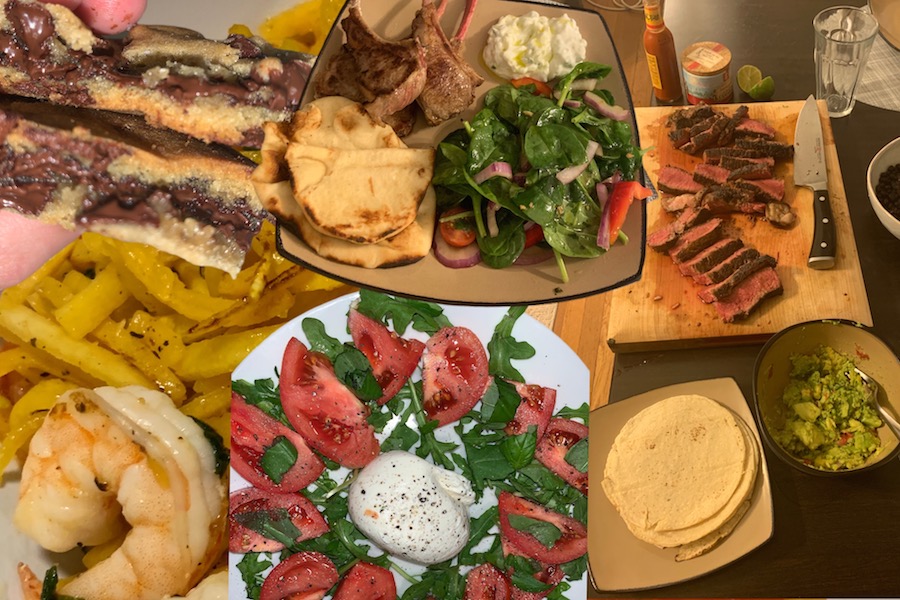Without a meal plan, underclassmen adjust to cooking for themselves in off-campus housing this quarter
Courtesy of Maddie Malueg and Conrad Slorer
Collage of meals made by NU students living off-campus. After the University closed on-campus housing to most underclassmen, many are having to cook for themselves for the first time.
October 5, 2020
After Northwestern administrators announced a completely virtual Fall Quarter for first- and second-year students, some underclassmen opted to obtain off-campus housing. With the sudden change in housing, students who were prepared for dorm life are now adjusting to living without meal plans.
For some, like Communication freshman Alexis Diaz-Waterman, the adjustment to home cooking has been seamless.
“I personally really like cooking for myself because then I can make whatever I’m in the mood for,” she said. “I think it’s fun to find recipes even if it’s not a full meal.”
In addition to being both rewarding and therapeutic, students said cooking presents a significant financial advantage.
Before the pandemic, all underclassmen were assigned to the Open Access Meal Plan, which offered unlimited swipes at dining halls and cost $2,246 per quarter.
McCormick freshman Conrad Slorer said the cost of the meal plan motivated him to begin cooking at home. The cost of Slorer and his roommate’s groceries combined for the quarter, he said, is a fraction of one underclassman’s Open Access Meal Plan. Besides, home-cooked food just tastes better, he said.
“The food we get and make is way, way better than what we would be eating in the dining hall,” Slorer said. “For the little amount of time of shopping and cooking, I think it is really worth it.”
Slorer said he has been cooking lentil, pasta, rice and bean-based meals. One of his go-to dishes are tacos with either chicken, beef or vegetables.
On the other hand, students cooking in off-campus housing also reported troubles with estimating correct food quantity when grocery shopping and meal preparing.
“At home, when I’m living with my family, we always go grocery shopping for everyone, and if there’s fresh food that’s about to go bad, I know someone else will eat it,” Diaz-Waterman said.
Weinberg sophomore Peter Radler, who was on the mandatory meal plan last year argued there were benefits to a meal plan. It provides structure and students know what they are getting in advance, he said.
Buying too many or too few groceries can generate stress and inconveniences, Radler said, and the University-designated meal plan eliminates that.
“There are a lot more options and you know what you’re getting,” Radler said. “There is less stress around a meal plan because you know what they’re serving in the dining halls so you can get a more balanced meal.”
Frozen and pre-prepared meals from Trader Joe’s help eliminate portioning problems and curb cooking fatigue, Radler said.
However, the meal plan provides students with more than just food. Dining halls are an optimal space for new students to make friends and organically form connections with their peers. The eight dining locations on campus double as social spaces, Diaz-Waterman said, and she looks forward to those interactions.
“I’m excited for it for the social aspect of it because then I can study [in the dining hall] and other people can study with me there, too,” Diaz-Waterman said.
Email: mollyvangorp2024@u.northwestern.edu
Twitter: @GorpMolly
Related Stories:
— Sophomores form “pods” to live together during remote learning
— NU students discuss taking remote classes at home
— Students stay active on and off-campus



